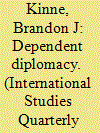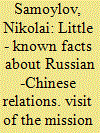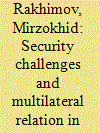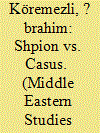|
|
|
Sort Order |
|
|
|
Items / Page
|
|
|
|
|
|
|
| Srl | Item |
| 1 |
ID:
133643


|
|
|
|
|
| Publication |
2014.
|
| Summary/Abstract |
Diplomatic recognition is an essential tool of statecraft but remains largely unanalyzed by political scientists. Two recent trends in diplomatic practice raise notable puzzles: (i) use of diplomatic ties to signal (dis)approval of a regime or its policies, based largely on cues from diplomatic partners, and (ii) reliance on diplomatic missions as a means of securing prestige in the international system. I argue that both trends are the result of network influences. States face resource constraints and must choose diplomatic partners wisely, but they lack complete information about the risks and benefits of extending diplomatic recognition. To solve this informational dilemma, they condition recognition on the diplomatic activity of others. First, states send missions to countries that host missions from their own diplomatic partners, which increases the strength of diplomatic signals and reduces political risks. Second, states send missions to countries that host large numbers of missions in general (that is, "prestigious" countries), which increases their capacity for information gathering. In general, a state's decision to extend or retract diplomatic recognition depends heavily on the decisions of other states. Employing novel network methodologies, I show that these endogenous network influences are among the most consistent and substantively powerful determinants of diplomatic recognition.
|
|
|
|
|
|
|
|
|
|
|
|
|
|
|
|
| 2 |
ID:
087658


|
|
|
|
|
| Publication |
2009.
|
| Summary/Abstract |
This article uses Chinese and Russian sources to relate the visit of a Chinese diplomatic mission headed by Anson Burlingame, Zhi Gang, and Sun Jiagu to St. Petersburg. It reveals unknown details about this visit showing that the Russian government received the Chinese delegation at the highest level, observing all the rales and standards of diplomatic etiquette of that time. It was in St. Petersburg that the mission leader, American diplomat Burlingame, passed away, requiring his immediate replacement. This first official mission of the Qing Empire to a Western country was a milestone in the development of relations between Russia and China and helped to bring them up to a qualitatively new level by paving the way to establishing China's permanent embassy in Russia.
|
|
|
|
|
|
|
|
|
|
|
|
|
|
|
|
| 3 |
ID:
129410


|
|
|
|
|
| Publication |
2014.
|
| Summary/Abstract |
New geopolitics and security Central Asia faced considerable political, social, and cultural changes throughout the whole of the 20th century; since the beginning of the 21st century, the region is confronted to new steps of the geopolitical transformation. Some experts say that Central Asia is returning to the Great Game of the 19th century but with new players. It is well-known that Central Asia historically was in the center or important aspects of interest of different empires and one could say that the region was more or less in Great Game situation during all periods of its history. After the collapse of the Soviet Union, the newly Independent Central Asian republics tried to form new bilateral and multilateral relations and within a short time the Central Asian nations were formally recognized by many countries, which established with most of them diplomatic ties and exchanged diplomatic missions. The region's countries have joined the main international and regional organizations.
|
|
|
|
|
|
|
|
|
|
|
|
|
|
|
|
| 4 |
ID:
128218


|
|
|
|
|
| Publication |
2014.
|
| Summary/Abstract |
In October 1853, a war erupted between the Russian and the Ottoman empires, which became the celebrated Crimean War in the following year. The Danubian theatre, one of the crucial scenes of the war, witnessed both belligerents trying to discover the other's activities and planned operations. As they were inhabited by cosmopolitan and heterogeneous populations, Dobruca (Dobruja) and Bessarabia were the most convenient places for both parties to gather military intelligence. The Ottomans acquired information via the Wallachians and the Cossacks, as well as by diplomatic missions and various merchants. The Ottoman Empire's Orthodox Christian subjects - the Bulgarians and Greeks - assisted Russia in gathering information from the right bank of the Danube. Some of these reports were unreliable, as were the spies themselves. The Russian and Ottoman archives have rich resources related to military intelligence, which is an understudied aspect of the Crimean War. Relying upon the archival sources, this paper aims to discuss an entirely ignored topic: the espionage activities in the Balkan theatre during the Crimean War.
|
|
|
|
|
|
|
|
|
|
|
|
|
|
|
|
| 5 |
ID:
182419


|
|
|
|
|
| Summary/Abstract |
North Korea frequently uses diplomatic missions, diplomats and intelligence officers in its Weapons of Mass Destruction (WMD) proliferation and arms trafficking networks. The paper places the use of these assets in historical context, provides a basic typology of their role, and considers why they have featured in North Korea’s networks. The paper identifies a number of trends surrounding the use of North Korean missions – including the types and locations of missions featuring in specific types of proliferation and arms dealing activities, the prominence of larger missions and use of third country and regional hubs. It argues that the persistence of these assets in the DPRK’s networks is largely a result of convenience and diplomatic immunity. The paper concludes by recommending further action to counter these assets while arguing that the phenomenon will continue to be a challenging feature of North Korea’s proliferation and arms trading activities.
|
|
|
|
|
|
|
|
|
|
|
|
|
|
|
|
|
|
|
|
|